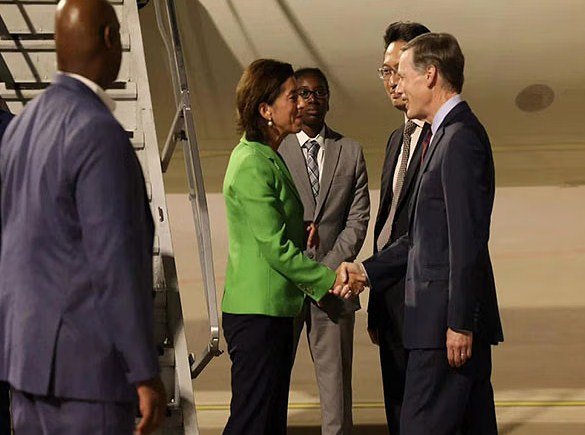Raimondo meets with Chinese officials in Beijing
U.S. Commerce Secretary Gina Raimondo visited Beijing on Monday and met with Chinese Vice Premier He Liu and Commerce Minister Wang Wentao. The meetings were part of her trip to Asia, which also included stops in Japan and South Korea.
Raimondo said she had “very open” discussions with her Chinese counterparts on a range of issues, including trade, investment, technology, and human rights. She said she conveyed the U.S. concerns about China’s unfair trade practices, such as forced technology transfer, intellectual property theft, and subsidies to state-owned enterprises.
She also expressed the U.S. willingness to cooperate with China on areas of mutual interest, such as climate change, public health, and supply chain resilience. She said she hoped to establish a regular dialogue with China to address the challenges and opportunities in the bilateral relationship.
“We have a long way to go, but I think it’s important to start the conversation and to keep the lines of communication open,” Raimondo said in an interview with CNBC.
U.S. tightens export controls on advanced chips to China
One of the main topics of discussion between Raimondo and her Chinese counterparts was the U.S. export controls on certain advanced computing semiconductors or related manufacturing equipment to China. The U.S. Department of Commerce announced the new restrictions in October 2022, citing national security reasons.
The export controls aim to prevent China from acquiring the most sophisticated chips that can be used for artificial intelligence, quantum computing, and military applications. Raimondo said the U.S. had to take this step because “these semiconductors are unbelievably powerful, and we can’t afford to let them get into the wrong hands.”
She also said the U.S. would continue to update its export controls as technology and China change. “We have to change constantly,” she said. “I know that’s hard for industry. They want a clear line in the sand. The truth of it is though, technology changes, China changes and we have to keep up with it.”
She added that she was working on a new way to restrict China’s access to certain technologies by setting up “a continuous dialogue” between business and government engineers. “If you redesign a chip around a particular cut line that enables [China] to do AI I’m going to control it the very next day,” she said.
China responds cautiously to U.S. overtures
China’s official response to Raimondo’s visit was cautious and reserved. The Chinese Commerce Ministry issued a brief statement saying that the two sides had “candid and constructive” exchanges on trade and economic issues, and agreed to “maintain communication and support practical cooperation between businesses from both countries.”
The statement did not mention any specific areas of agreement or disagreement, nor did it indicate any willingness to address the U.S. concerns about China’s trade and technology policies.
China has repeatedly rejected the U.S. accusations of unfair trade practices and insisted on its right to develop its own technology and innovation capabilities. China has also accused the U.S. of abusing its export controls and sanctions to suppress China’s legitimate development interests and interfere in its internal affairs.
China’s state media also downplayed the significance of Raimondo’s visit, saying that it was unlikely to lead to any breakthroughs or changes in the tense and complex relationship between the two countries.
U.S. seeks to balance competition and cooperation with China
Raimondo’s visit to China was the first by a U.S. commerce secretary since 2014, and the highest-level economic dialogue between the two countries since the Biden administration took office in January 2022. It came amid growing tensions and competition between the U.S. and China over trade, technology, security, and human rights.
The Biden administration has said it wants to pursue a policy of “strategic competition” with China, which involves confronting China on areas of disagreement, while cooperating on areas of common interest. The administration has also said it wants to work with its allies and partners to present a united front against China’s challenges to the rules-based international order.
Raimondo’s trip to Asia was part of this strategy, as she also met with officials and business leaders in Japan and South Korea to discuss ways to strengthen the economic and technological ties among the three countries. She said the U.S. was committed to supporting its allies and partners in the region and ensuring a free and open Indo-Pacific.

